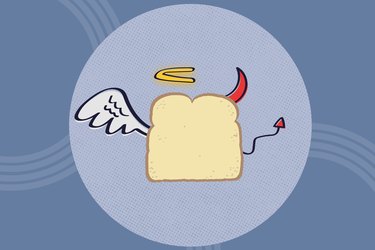
Low-carb diets are the burpees of nutrition: Sure, they might be effective, but are they worth the pain?
OK, that might be a bit extreme. After all, the number of weight-loss testimonials from keto and other low-carb diet devotees continues to grow, and the results are, well, tempting. But are those impressive success stories too good to be true? And are low-carb diets healthy in the long term?
Video of the Day
Video of the Day
For our Ask the RDs series, we asked readers to send us their biggest nutrition questions and then posed the 12 most common to a panel of registered dietitians. It turns out everybody has low-carb confusion. Here, the experts break it down.
Is a Low-Carb Diet the Right Move for Me?
"One of the pros of the keto diet is that most people will see a significant weight loss initially. Carbohydrates hold onto water, so because you're not eating carbohydrates, you're going to lose some water weight. It's encouraging to people trying to lose weight because you get that boost from eating keto or low-carb.
And also the foods you're encouraged to eat on keto are high-fat, so they're tasty, they've got a good mouthfeel. Avocado, cheese, bacon, steak — things like that. For a lot of people, the foods that the keto diet is made of are their favorite foods.
If you're doing keto in a healthy way, it encourages non-starchy vegetables, leafy vegetables like kale, cauliflower, green peppers. Some people also enjoy the benefits of increased clarity or mental focus.
"Some people don't feel good doing keto. If they're not drinking enough water or getting enough electrolytes, they might have what's called the keto flu."
One of the cons is that you might get sick of not eating carbohydrates, especially if you're someone who absolutely loves carbohydrates, or it's a part of your culture or how you and your family enjoy meals.
In that case, you might want to do a cyclical keto, where you're cycling in and out. Or maybe you're doing keto most of the time and then on weekends you might want to enjoy a slice of pizza or some pasta with your family.
Another con is that some people don't feel good doing keto. If they're not drinking enough water or getting enough electrolytes, they might have what's called the keto flu.
It might just not be a good fit for them, and they might find there are other ways to lose weight or maintain weight that are a better fit. It always comes down to the person — your individual preferences, your individual lifestyle."
"To me, the most important principle I've used since I went into this business decades ago is the word balance. I really believe in balance. I think it's important to feel balanced in the way you feel throughout the day. It's important to eat a diet that's balanced so that you're getting a bit of everything.
Keto is about 75 percent fat. That, to me, is unbalanced. So, I am not a fan of that diet because I think for most people — and I know there are plenty of people who love this diet and that's fine for them — it's not sustainable.
If your regular diet is really high in carbs and you're cutting them down so that you're having smaller portions, I think that could be a great idea. I'm a supporter of lower-carb diets but not the severely low, restricted-carb diets that a lot of people follow."
"The cons of a low-carb diet can include low energy and weakness in the gym, which can affect athletic performance, whether it's strength training or running.
You can also become deficient in some nutrients, such as fiber, some B vitamins and, if you're not doing any fruit, potassium and vitamin C.
Then there's the sustainability. It's very hard to stay on a ketogenic diet for the long term. When you're running on 25 to 50 grams of carbohydrates per day, it's really hard to stick to that.
"Low-carb diets like keto can have a place, but I would try to get people to be more flexible and modify a little bit."
When it comes to benefits: A lot of people are eating high amounts of carbohydrates — and mostly unhealthy ones — so when they're reducing carbs, they're going to maybe cut down on some of those processed foods.
Of course, there may be weight loss, because when you're cutting out so many of those foods, you're going to lose weight, and people do enjoy that.
Low-carb diets like keto can have a place, but I would try to get people to be more flexible and modify a little bit. I would add in whole grains and more fruits and suggest sticking to the higher-quality carbohydrates.
Maybe instead of 25 to 50 grams of carbohydrates, shoot for a lower-carbohydrate diet of 100 to 130 grams of carbs per day. Maybe try and get to that level at least, and if you're exercising, you might need a little bit more. But don't sink as low as 25 to 50 grams per day."
The Takeaway
Low-carb diets like keto can help with weight loss, might improve mental clarity and can encourage eating more non-starchy vegetables and healthy fats; however, low-carb eating plans can be difficult to sustain in the long term, may cause nutritional deficiencies and might leave you feeling weak or low energy. If you are considering trying a low-carb diet, speak with a doctor first to make sure it's right for you.
Confused about nutrition? Get answers to more common questions in our Ask the RDs series.


